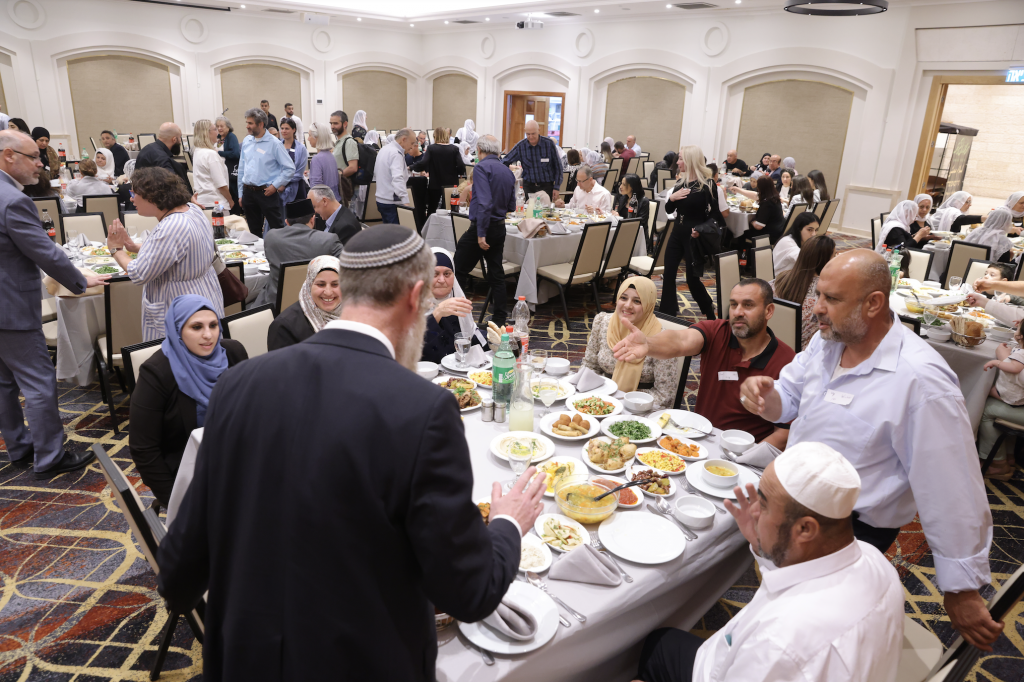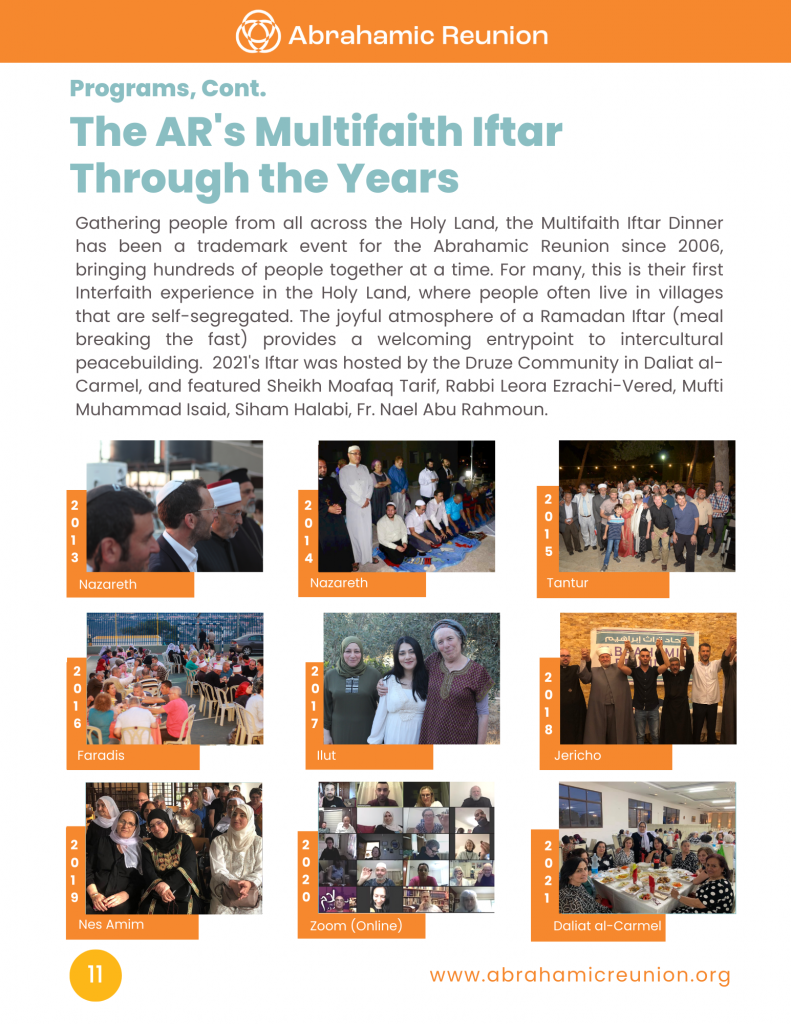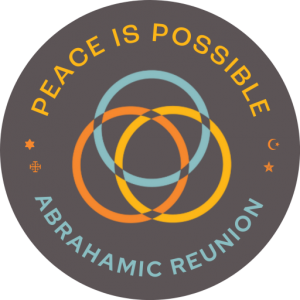What is the Multi-Faith “Iftar” and Why Does it Matter?

“Iftar” means, literally, breaking the fast. During the month of Ramadan, the month commemorating the revelation of the Qu’ran to the Prophet Mohamad, Muslims fast and gather each night for festive Iftar Meals, a special time of openness and generosity. This is a time when openness to the other and idealism run higher, creating a beautiful and religiously-infused opportunity for peacebuilding work.
The Abrahamic Reunion’s Multi-Faith Iftar is more than just a meal — it’s an entire evening dedicated to intercultural and interreligious gathering, meeting, music, speeches, prayer, food, dialogue, and community. The Iftar is an invitation to all the members of the Abrahamic traditions to gather at a single feast for peace, an intentional statement of the acceptance and intercultural friendship that has existed in the Holy Land for centuries, which is the goal held forth by the Abrahamic Reunion, a vision of plurality and celebrated diversity.
What is so important about the Iftar? Don’t these kinds of events happen all the time? The Multi-Faith Iftar in the Holy Land is more rare than you can imagine. While to Western eyes this may appear, yes, to be a beautiful and lovely event, for Palestinians and Israelis embedded in the daily contentiousness and fraught environment of struggle in the Holy Land, to see leaders and people from all the communities come together and share food at the same tables, enjoy music, discussion, and dialogue is a rare and shining example of what can be.
For many Palestinians, being seen at an event with a Rabbi, and for many Jews, being seen with Palestinians or Muslims, can be dangerous. Participation can lead to reprisal for participants, who can be labeled as “normalizing relations with the enemy”, the oppositional mentality which the Abrahamic Reunion works to transform into communal, empathetic upliftment for all peoples of the Holy Land.
How does the Multi-Faith Iftar make an impact in the Holy Land? For many AR participants, the Iftar is the first event they attend. The Iftar’s large-event size, feast atmosphere, and facilitated space is a gateway for more leaders, individuals, and communities to join in the joy of knowing and celebrating each other in a safe space. Without the Iftar, many participants would not break bread with “the other”, especially not in such an intentional fashion.
The Abrahamic Reunion’s Multi-Faith Iftar uses many components to make an impact and build peace in the Holy Land. Here is a closer look at how the Iftar builds peace:
Encounter
Meeting the Other

Life in Israel/Palestine is full of divisions – social, religious, diet-related, political, and physically, neighborhood and cities are generally either Jewish and Hebrew speaking, or Arab and Arabic-speaking.
At the Iftar, those divisions are first physically relaxed as leaders and peacebuilders from all cultures greet each other in the hope of peace.
Dialogue
Structured safe spaces for dialogue and interreligious text study

Creating a safe space is a hallmark of Abrahamic Reunion events, where participants can learn more about “the other” by exploring commonalities in religious texts, culture, and dialogue in small circles. Participants share stories and get first-hand experience “across the aisle” as we would say in the US. This brings an emotional relaxing of cultural and religious divisions by focusing on commonality and listening to the other.
Leadership:
Speeches, Blessings & Prayers that Honor All Faiths & Peoples

Leaders from the different religions, and cultural, political, peace, and intellectual leaders set the tone, referencing the scriptural and cultural supports for interconnection, plurality, and diversity.
The current situation is also addressed, solutions proposed, prayers, blessings, poems, and songs shared. Leaders (and all peacebuilders) invited to the Iftar also share their experience and the message of the Iftar with their communities, creating a positive ripple effect.
Shared Meal
Breaking Bread with the Other

Sahtain – Bon Appetit! It is a tradition, after fasting all day, to feast!
The symbolic sharing of a meal, which Jews, and Christians also abstain from until the official time when Muslims break the fast for Ramadan, is one of the deepest symbols of acceptance, trust, and interconnection. Participants continue the conversation at dinner tables that are seated intentionally to mingle the different traditions and groups in attendance.
Community
Friendship, Unstructured Time to Connect

Now that the ice has been broken, the leaders and participants have spoken, and the feast has been partaken, leaders and participants mingle, converse, laugh, share stories, discuss fasting, culture, and develop friendships. Pictured above: Shahed Bagdadi, Sufi Muslim Young Peacebuilder, and Hanan Halabi, Druze Young Peacebuilder.
Collaboration
Leadership Networking & Coalition Building

Heads of entire religious communities across the country, politically connected figures, congregation leaders, educators, ministers, intellectual and cultural leaders gather to open channels, share ideas, build coalitions, and dream of a brighter future for the Holy Land together. The Iftar, and the Abrahamic Reunion, are both examples of multi-faith collaboration that set the tone for building the broader culture of peace the Holy Land needs, and an appearance at the Iftar constitutes a statement of openness to creating solutions. Pictured above: Rabbi Shlomo Dov Rosen confers with Ahmediyya leaders, while Rabbi Doron Danino discusses with one of the Druze Judges, following the meal.
Peace
Diversity, Acceptance, Harmony, Love, Connection, Knowledge, And Joy

Since the first Multi-Faith Iftar in 2006, the community fostered through these gatherings and the Abrahamic Reunion’s dedicated intercultural community building has become a showcase and testament to the will for peace in the Holy Land. By the end of the evening, leaders and peacebuidlers from across the region now gather, arm-in-arm with renewed hope, commitment, plans, and the joy of gathering intentionally. Pictured above: Leaders at the 2022 Iftar in nazareth pose for a group photo, Jews, Muslims, Druze, Ahmediyya, Sufis, Christians, Palestinians and Israelis.
2022 Iftar 5-Minute Mini-Documentary
More Iftar Links
- Our 2023 Multi-Faith Iftar at the Hartman Institute, Jerusalem
- Donate to the 2023 Iftar Campaign
- 2022 Multi-Faith Iftar in Nazareth
- 2022 Multi-Faith Iftar in Daliat al-Carmel
- 2022 Iftar in Jericho, West Bank
- 2021 Iftar in Daliat al-Carmel
- 2020 Online Multi-Faith Iftar
- 2019 Iftar in Jericho, Palestinian Territories
- 2018 Iftar at Nes Amim
- 2018 Iftar in Jericho, Palestinian Territories
- 2017 London Interfaith Iftar, + Photos
- 2017 Iftar in Ilut, home of Dr. Khalid Abu Ras
- 2016 Iftar in Faradis
- 2016 Iftar in Sarasota, Florida
- 2015 Iftar at Tantur Ecumenical Institute (Video)
- 2014 Multi-Faith Journey & Iftar in Nazareth
- 2013 Iftar in Nazareth
- 2008 Iftar in Yafia
- 2007 Iftar in Yafia
- 2006 Iftar in Yafia
Iftar Through the Years


